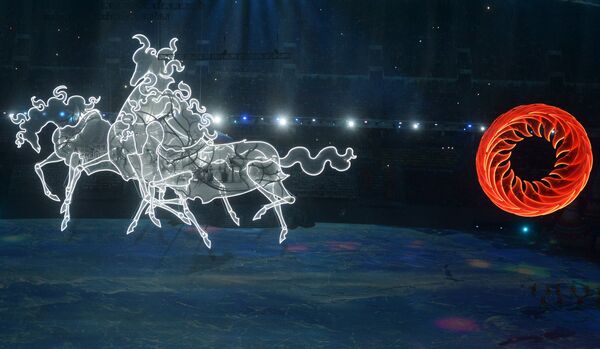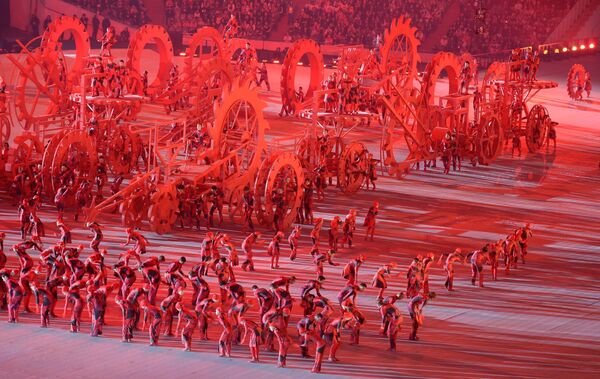WASHINGTON, February 8 (RIA Novosti) – Leading US media expressed awe at the lavish opening ceremony of the 2014 Sochi Winter Olympics, but also portrayed it as a spectacle glossing over controversies surrounding Russia's human rights record and its Stalinist past.
"It was so entrancing, and ran so smoothly, that it was tempting to forget what was behind the pageantry and sparkle," New York Times sports columnist Juliet Macur wrote of Friday night's ceremony, which organizers say was watched by 3 billion people worldwide.
Macur accused the Russian government of erecting "suffocating restrictions" of freedom of speech and violating the rights of gay people with a controversial law banning the promotion of homosexuality to minors – criticisms the Kremlin has repeatedly rejected as baseless.
Those two issues must not be ignored during the Games, Macur wrote in her column under the headline "The Darkness Behind Sochi’s Sparkle."
David Herzenhorn, the Moscow bureau chief for the Times, called the ceremony an "outsize extravaganza" in which "a swaggering, resurgent Russia turned its Winter Olympic aspirations into reality."
"The message of the over-the-top ceremony was simply this: In a big way, Russia is back," Herszenhorn wrote.
He noted that the ceremony, which offered a sweeping overview of Russian history in 18 parts, "involved some breezing past inconvenient episodes" such as Soviet leader Josef Stalin's purges and brutally expansive prison system.
"The ceremony was, in many respects, the introduction to the world of a re-created Russia, one far different from the Union of Soviet Socialist Republics that hosted the Summer Games in Moscow in 1980," Herszenhorn wrote.
In his report on the ceremony and the ambitious Sochi Games, veteran Boston Globe reporter John Powers – who has covered every Olympic Games since 1976 – also alluded to the 1980 Summer Olympics in Moscow, which was boycotted by the United States and dozens of its allies after Soviet forces invaded Afghanistan the previous year.
"The Moscow Games belonged to a bygone country, an ungainly and unmanageable agglomeration of mismatched pieces that bordered a dozen neighbors and already was starting to come apart," Powers wrote. "The Sochi Games celebrate the original centerpiece of the USSR, the Russia that has been going through a turbulent transition for more than two decades."
Powers found the organizers' choice to light the Olympic cauldron at the ceremony's conclusion particularly fitting: "the two icons of the quintessential Russian sports — hockey goalie Vladislav Tretiak and pairs skater Irina Rodnina," he wrote.
Los Angeles Times sports columnist Bill Plaschke wrote that the opening ceremony "highlighted the beauty of the Russian culture and strength of the Russian spirit" but that it "did little to lift the cloud of uneasiness hanging over a Games that began amid protests over Russian anti-gay laws and fear over terrorism."
He also gave a positive appraisal of the 40,000 spectators that packed the Fisht Olympic Stadium for the show, calling them "a largely Russian crowd that seemed genuinely delighted by the experience."
"Unlike crowds in other Olympics, they clapped for everyone, booed nothing, and remained in their seats through the post-show fireworks," Plaschke wrote.

Having watched the television feed of the ceremony, Washington Post television critic Hank Stuever was less impressed with the spectacle, though he expressed a distaste for opening ceremonies in general and conceded that his opinion might be different had he seen the show in person.
"There were great touches throughout the ceremony, but none of them amounted to anything jaw-dropping," Stuever wrote.
Stuever lauded the host of the US broadcast, Matt Lauer of NBC, for his segue to a word from the sponsors.
“Imperialism in Russia is about to be swept away by two important events — the Russian revolution and this commercial break," Lauer said.


